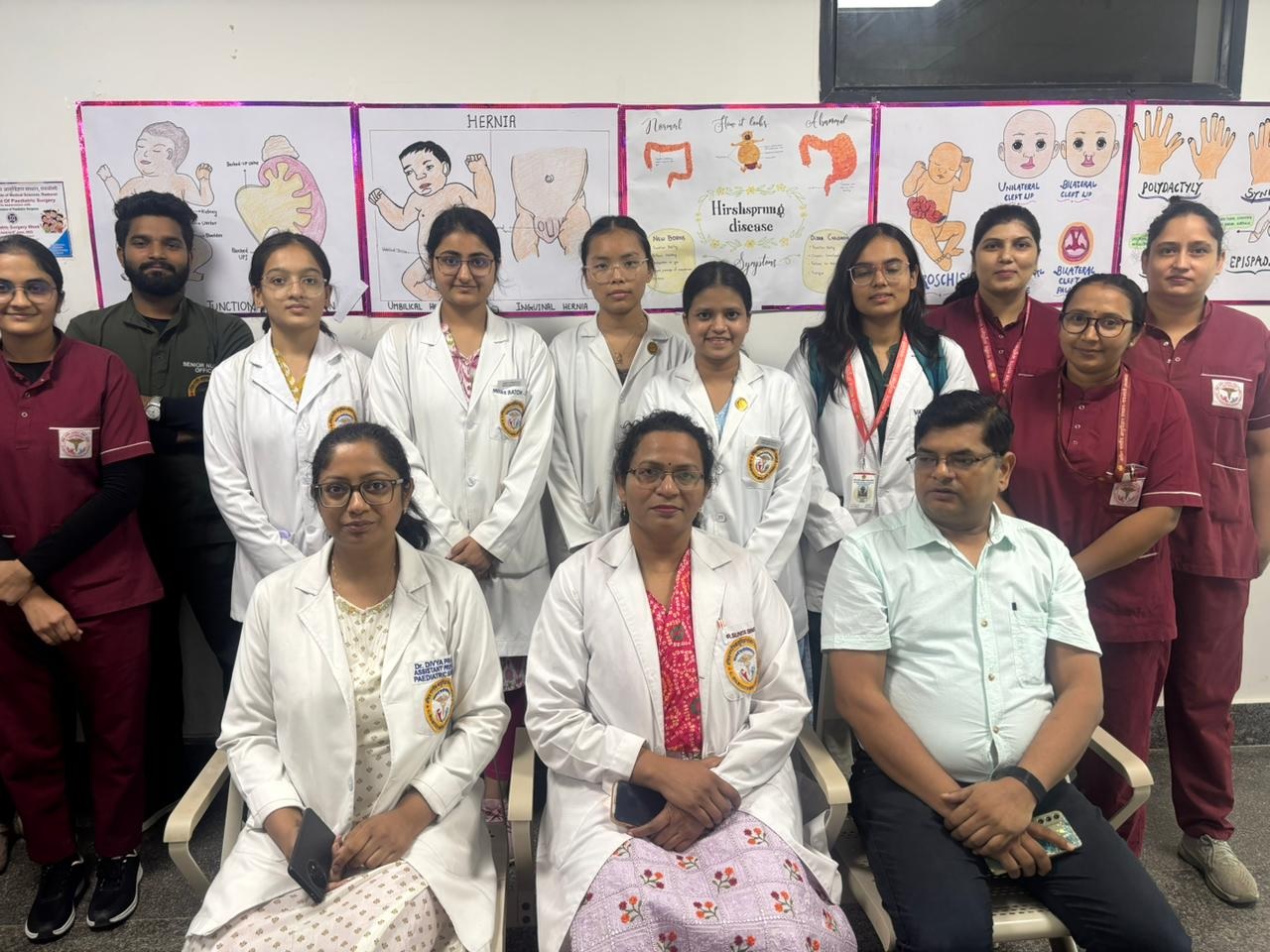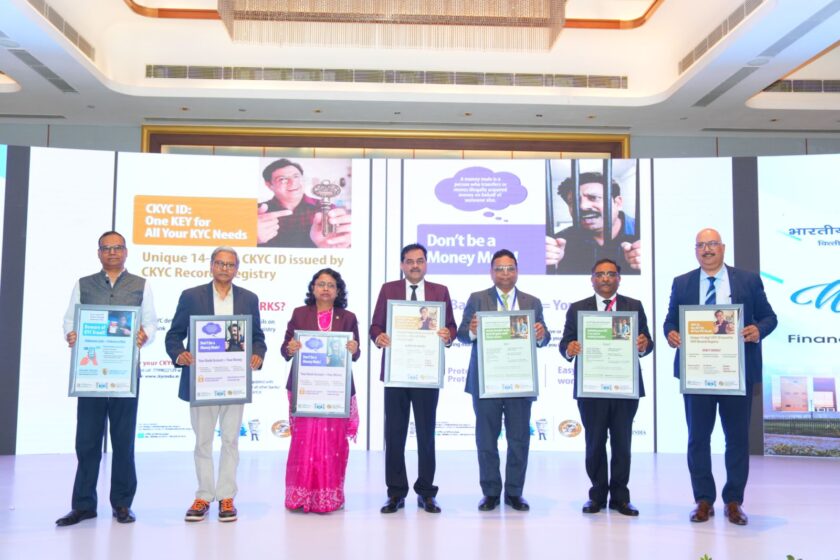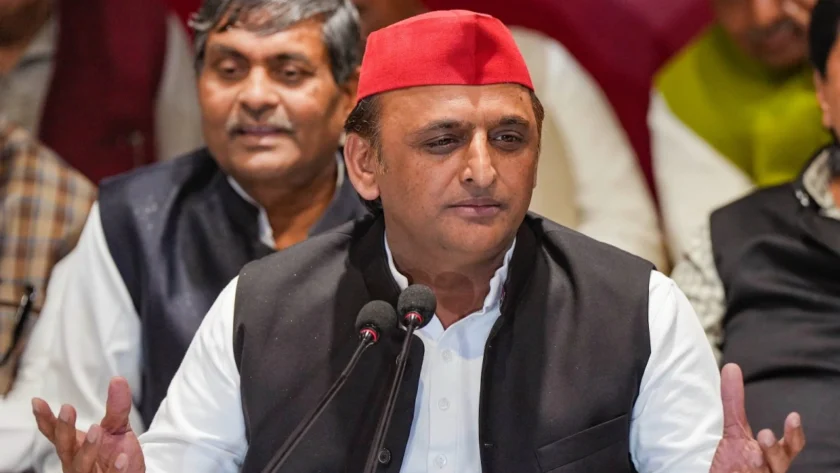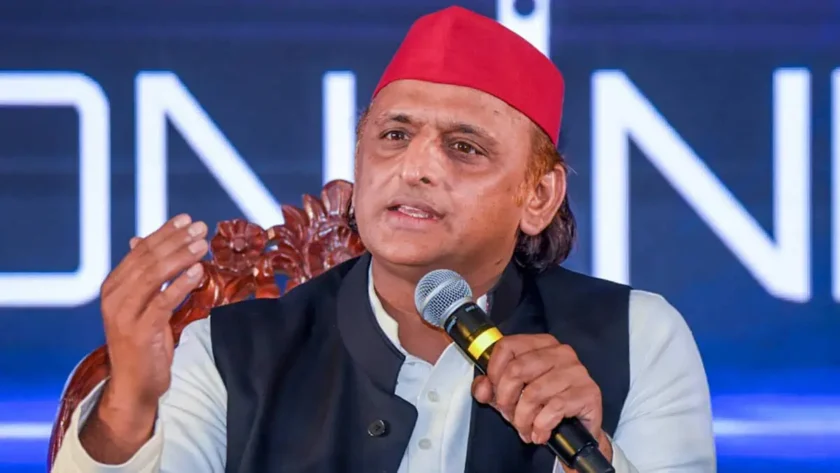Raebareli: The paediatric surgery week is celebrated all over the India by various government and private organisation. The Paediatric Surgery Week was celebrated from June 2nd to June 8th by the Department of Paediatric Surgery at the All India Institute of Medical Sciences, Raebareli.
Paediatric Surgery Week is celebrated every year in the second week of June in India, to popularise the speciality among the general public about a field that truly touches lives at their most delicate stage—paediatric surgery.
The program was run under the guidance of Dr Sunita Singh, the head of the department. The MBBS students, nursing officers, and nursing students performed a skit and interacted with the general public to make people aware of the speciality of paediatric surgery. During this paediatric surgery week, the faculty from paediatric surgery messaged the general population that congenital anomalies can be prevented to some extent by not taking alcohol, no smoking, control of diabetes, appropriate intake of folic acid and immediate consultation with a lady doctor for any fever, or rashes, and appropriate vaccination. The outdoor services by the Department of Paediatric Surgery are running every day at rooms 155/156. Parents can approach us at any time to discuss problems with their child. the Department of Paediatric Surgery, AIIMS Raebareli, offers all types of surgeries in children, including laparoscopic surgeries. To date, more than 1000 children have been successfully operated on and discharged from AIIMS Reabareli. The surgeries included correction in passage of anus and urethra, treatment of difficulties in urination, body structure, diaphrgagmatioc hernia, obstruction in bowel, hirshchsprung, hypospadias (the urethral opening is not use to found at the correct place), pus in chest (empyema thorasis) etc. the facility of paediatric urodynamics will also availavel shortly in department of paediatric surgery.
When we think of surgery, we often think of complex tools, skilled hands and long hours. But in paediatric surgeons tools are even more delicate, the surgeons’ hands are more precise, and the responsibility is much greater. paediatric surgeons operate on newborns weighing just over a kilogram to young teens up to 18 years of age reaching adulthood.
The children cannot always tell what hurts them, but their parants still trust us that we will treat them appropriately. Operating on a child is a commitment to healing the most vulnerable population. Paediatric surgery not only covers congenital anomalies but also a wide range of conditions: like paediatric trauma, tumors, and almost all surgeries of adult. But the children are not just small adults; their bodies, minds, and emotional needs are entirely different. A paediatric surgeon must be a surgeon, a physician, a counsellor, a teacher/trainer, and sometimes act as a magician—able to ease fear with a smile, while solving most complex procedures. Every operation of paediatric surgery is not just about fixing a problem—it’s about giving a child the chance to live a full, healthy life.
Congenital anomalies, also known as birth defects, are structural or functional abnormalities that occur during intrauterine life and can be identified prenatally, at birth, or later in life. Paediatric surgery is dealing with Structural defects: e.g., neural tube defects, cleft lip/palate, and congenital heart defects. While paediatricians are dealing with functional abnormalities.
WHO estimates that 6% of all live births worldwide are affected by a serious congenital anomaly. The global average prevalence rate is approximately 20–30 per 1,000 live births. the rate of anomalies various by region due to differences in: Nutrition (e.g., folic acid intake during conception), ,Environmental related reasons, Genetic factors, Infections during pregnancy (e.g., Zika virus, rubella virus)
The disease burden is disproportionate in low and middle-income countries (LMICs). They account for 94% of the disease burden. The birth rate of congenital anomalies in India is about 184.48 per 10,000 total births.
Global is approximately 295,000 neonatal deaths every year (WHO, 2023).They are the important cause of under-five mortality. According to a research conducted in 2017, birth defects caused 37,104 deaths in the early neonatal period and 27,120 deaths in the post-neonatal period in India, with rates approximately double those of middle-income countries.

Physical incapability (e.g., limb defects), Psychological stress, Social non-acceptance, inability to go to school at an appropriate age and parental mental stress are some of the consequences of birth defects.
Socioeconomic burden on parents, societies and the healthcare system due to birth defects is due to sometimes the need for multiple surgeries, long-term rehabilitation needs of children within the society, and lifelong monitoring for some diseases. High cost of health care and lack of appropriate insurance for congenital anomalies are one of the reasons to push these families toward poverty
Throughout the week, the public was made aware that the treatment of congenital anomalies is possible, and a child can lead an everyday life if treated appropriately at the right age by the right person at the right time. For any surgery of a paediatric patient, a paediatric surgeon is the best option. Today, paediatric surgery is a high-tech surgical branch, managed by a group of specialists.
Laparoscopy surgery, Robotic surgery etc. benefits for smaller incisions, less pain, and a faster recovery after surgery.
In some parts of india Some anomalies, such as spina bifida, can now be treated while the baby is still in the womb
Genomic medicine and 3D printing: Helps surgeons to plan treatment for rare congenital disorders.
At the end of paediatric surgery week dean examination Prof. Pragati Garg, prof Rajat Subhra Das, and Professor Prabal Joshi, Colonel Upendra Nath Rai Dr anupreet, Dr Divya Prakash, Dr Umesh Gupta , Dr Vandana Verma and Dr Mrityunjay Kumar distributed prizes to nursing officers and students for their hard work and poster competitions.










